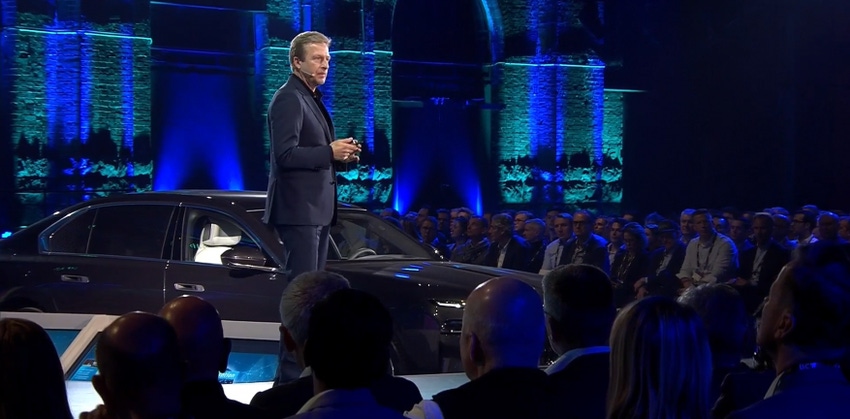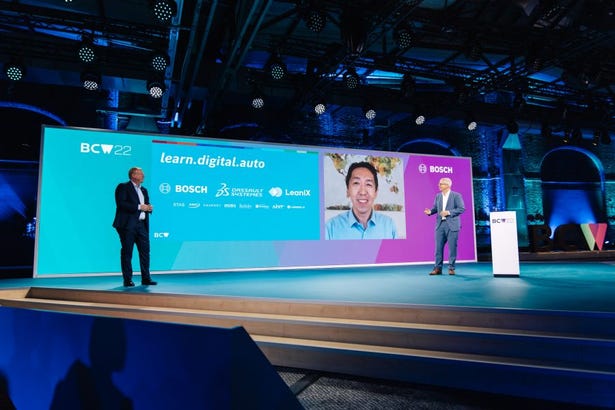Speakers at Bosch Connected World 2022 detailed the future of mobility, and the importance of accessibility and transparency.

Sustainability was a central theme for keynote speeches at Bosch Connected World (BCW), as speakers detailed the role transparency and a green agenda play in consumer appeal and commercial longevity.
Oliver Zipse, BMW CEO, took to the stage to discuss the future of connected mobility – and how sustainability will be held at the heart of business operations.
“The future is about collaboration and interaction,” said Zipse. “If we are able to connect science and research with economic disciplines, then we’ve found the key for the future.”
Zipse also highlighted circularity as a central part of creating an economic business model for the future, pointing to the need for companies to commit to recycling products and implementing emission-reducing strategies to keep global temperatures down.
“Our strategic goal is to have at least 50% of the product content recyclable,” he said. “With our strategy, where circularity plays a major role, we’re right on the path to 1.5 degrees.”
Zipse also teased the company’s new round charging cell design which he said would “set a new benchmark” in charging ability, energy density and cost, with the ethos of circularity helping to reduce the cell’s cost by 50%.
“We have to combine the circular economy with electrification and digitalization,” he said. “Digitalization is not only about the car, it’s the whole company. It’s about production, it’s about product development and customer experience. We’ve made BMW digital and we would never again separate hardware from software, everything has to come together.”
With the introduction of new digital features to cars and the growth of rider-produced data, there also comes the rising threat of cyberattacks, with Zipse highlighting security as another primary driver in smart car design.
Yet the growth of data also enables sustainability and connecting the supply chain allows companies to provide transparency at every point of a product’s life cycle, securely enabling the quality of products, proving resource heritage and connecting each line of operation to enable interoperability.
Democratizing AI
AI is the latest disruptive technology fuelling digital transformation in mobility, as Andrew Ng, AI expert and founder of Landing AI discussed in the final keynote.

“AI is already well entrenched in consumer software internet companies,” he said. “But I think the biggest potential of AI still lies ahead of us. Everything from retail, travel and transportation and logistics, to automotive and assembly, can all use it, but the adoption of AI in these industries is still nascent and I don’t believe AI can reach its full potential until it’s accessible to everyone.”
Currently, high costs of customization are preventing AI from being deployed throughout these industries for specific use cases. However, the emergence of data-centric AI is offering a new, efficient means of completing these projects and tailoring platforms to meet users’ needs. This relies on inputting specific data points into the AI software to teach it what to learn and allow it to more strategically focus on the desired outcome.
“This system is learning continuously,” Ng said. “Even as you build an AI system and the world changes, you just update the data accordingly. This is all part of the journey to democratize AI, it allows smaller-scale companies to access the same platforms as larger ones. I hope that this will provide a foundation where we can give a lot more people the ability to build custom AI systems.”
With this possibility ahead of the automotive industry, opportunities in personalized features and predictive maintenance capabilities are huge and open the doors for organizations who may have previously been excluded from the benefits of AI.
This article first appeared in sister publication IoT World Today. Click here to subscribe to their newsletter.
About the Author(s)
You May Also Like


.jpg?width=700&auto=webp&quality=80&disable=upscale)
.jpg?width=700&auto=webp&quality=80&disable=upscale)
.jpg?width=700&auto=webp&quality=80&disable=upscale)


.jpg?width=300&auto=webp&quality=80&disable=upscale)

.jpg?width=300&auto=webp&quality=80&disable=upscale)